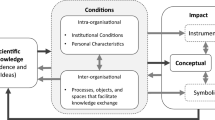Abstract
Improving the use and impact of science-based policies and practices at the national and transnational level is important for enhancing the quality and legitimacy of democratic governance systems. The purpose of this paper is to provide an overview of the major drivers behind strengthening the creation, application and mediation of scientific expertise for policy-making. Science-based policy-making can take different forms, such as evaluation of practices, implementation of independent or commissioned research, application of quantitative and qualitative analyses, or the development of statistical and environmental monitoring systems. However, scientific evidence is only one among several factors contributing to sound democratic decisions. Scientific expertise needs to be mediated through a complex process of social and political deliberation. The paper aims to identify the main policy challenges behind science advisory bodies and to set out an agenda for rebuilding public trust in science-based policy-making.
Similar content being viewed by others
Notes
Estlund’s theory – which he calls epistemic proceduralism – avoids epistocracy, or the rule of those who know. He argues that while some few people probably do know best, this can be used in political justification only if their expertise is acceptable from all reasonable points of view. If we seek the best epistemic arrangement in this respect, it will be recognisably democratic – with laws and policies actually authorised by the people subject to them.
In New Zealand, chief science adviser Peter Gluckman has described this dual justification in the following way. “Crucially, science advisers are obliged to advise in the context of the policy process. This means elucidating the evidence-informed options, rather than simply advocating a course of action. (…) There are many other appropriate inputs to policy, including fiscal considerations and public opinion. Policy-makers and elected officials rightly guard their responsibility to define policy — and this means choosing between options with different trade-offs” (Gluckman 2014: 164).
In a recent article, Nico Stehr (2013) has labeled this tendency the inconvenience of democracy. Among the voices of this argument are the Australian scholars David Shearman and Joseph W. Smith who in their book The Climate Change Challenge and the Failure of Democracy from 2007 wrote: “We need an authoritarian form of government in order to implement the scientific consensus on greenhouse gas emissions” (cited from Stehr 2013: 58) Furthermore, climate scientist Mark Beeson has claimed that “[…] forms of good authoritarianism, in which environmentally unsustainable forms of behavior are simply forbidden, may become not only justifiable, but essential for the survival of humanity[…]” (cited from Stehr 2013: 58).
Here, I quote in extenso from Arimoto and Sato (2012).
Further Reading
Arimoto, T., & Sato, Y. 2012. Rebuilding Public Trust in Science for Policy-making. Science and Society, 337, 1176–1177.
Bocking, S. 2013. Science and Society: The Structures of Scientific Advice. Global Environmental Politics, 13(2), 154–159.
Budtz Pedersen, D., & Hendricks, F. H. 2013. Science Bubbles. Philosophy & Technology, 45(3), 250–266.
Commission, E. 2008. Scientific Evidence for Policy Making. Brussels: European Commission Directorate-General for Research. Brussels.
Contandriopoulos, D., Lemire, M., Denis, J.-L., & Tremblay, E. 2010. Knowledge Exchange Processes in Organizations and Policy Arenas: A Narrative Systematic Review of the Literature. The Milbank Quarterly, 88(4), 444–483.
Estlund, D. M. 2011. Democratic Authority: A Philosophical Framework. Oxford: Oxford University Press.
EurActiv. 2013. Top EU scientist calls for ethical standards to ease suspicion of industr, Published 11 April 2013, available at: http://www.euractiv.com [accessed 1 November 2013].
EuroBarameter 2010. Science and Technology Special Report. Brussels: European Commission. (online version http://ec.europa.eu/public_opinion/archives/ebs/ebs_340_en.pdf)
Gardiner, H., & Broad, W. J. 2009. “Scientists Welcome Obama’s Words”, New York Times. January, 21, 2009.
Gieryn, T. F. 1983. Boundary-Work and the Demarcation of Science from Non-Science: Strains and nterests in Professional Ideologies of Scientists. American Sociological Review, 48(6), 781–795.
Gluckman, P. 2014. The art of science advice to government. Nature, 507, 163–165 (13 March 2014).
Holdren, J.P. 2011. Next Steps to Ensuring Scientific Integrity, Communication from the White House, October 31, 2011 available at: www.whitehouse.gov [accessed 1 November 2013].
Jasanoff, S. 2009. The Essential Parallel between Science and Democracy, Seed Magazine.com, 17 February 2009.
Kappel, K. 2012. Democratizing Science: What could it mean?, lecture at the conference “Democratizing Science”, 14 December 2012, University of Copenhagen.
Lentsch, J., & Weingart, P. (Eds.). 2011. The Politics of Scientific Advice: Institutional Design for Quality Assurance. Cambridge: Cambridge University Press.
Nowotny, H., Scott, P., & Gibbons, M. 2001. Re-thinking Science: Knowledge and the Public in an Age of Uncertainty. Cambridge: Polity Press.
Pielke, R. A. 2007. The Honest Broker: Making Sense of Science in Policy and Politics. Cambridge: Cambridge University Press.
Stehr, N. 2013. An Inconvenient Democracy: Knowledge and Climate Change. Society, 50(1), 55–60.
Sutherland, W. J., Bellingan, L., Bellingham, J. R., Blackstock, J. J., Bloomfield, R. M., et al. 2012. A Collaboratively-Derived Science-Policy Research Agenda. PLoS ONE, 7(3), e31824. doi:10.1371/journal.pone.0031824.
Author information
Authors and Affiliations
Corresponding author
Rights and permissions
About this article
Cite this article
Pedersen, D.B. The Political Epistemology of Science-Based Policy-Making. Soc 51, 547–551 (2014). https://doi.org/10.1007/s12115-014-9820-z
Published:
Issue Date:
DOI: https://doi.org/10.1007/s12115-014-9820-z




